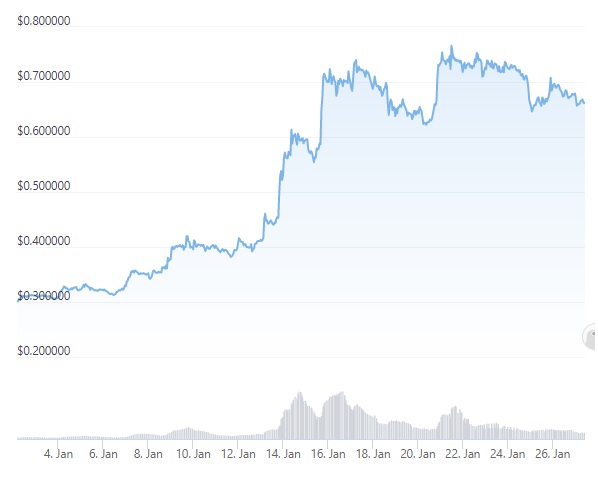MetaNews picks through another week of Metaverse hype with equal amounts of hope and skepticism as we chart a path through difficult waters to our brave new virtual world.
Here are the stories that made landfall this week on the metaverse review.
Canceled Apple of my eye
This week Apple announced that its mixed-reality headset will arrive as promised, but its follow-up product – Apple Glass – has been suspended indefinitely.
Apple Glass was originally scheduled for 2023 before being delayed to 2025. The company has now kicked the product into the long grass. Goodbye Apple Glass.
Apple will now seek to bring a less expensive, but not widely affordable, product to market in the nearer term. Apple’s premium mixed-reality device is set to cost $3,000. The less expensive option will look to compete with Meta’s mixed-reality device which retails for $1,500.
Metaverse hype counterproductive
Regular readers of MetaNews will know that there is no shortage of hype to be found in the metaverse and with metaverse-related topics.
With that hype comes raised expectations, which are sometimes difficult to meet in the shorter term. Alexandra Kuzmina, innovation consultant at Nova MMR, summed up the phenomenon in a panel session for The Market Research Society’s (MRS) Metaverse conference earlier this month.
“There has been no shortage of hype,” admitted Kuzmina as reported by ResearchLive on Thursday. “It is important to remind ourselves that what we see currently are only the fragments of what eventually will become the metaverse. There is a tendency today to believe the fragments, such as VR and augmented reality, are actually the metaverse.”
As for what happens when those fragments coalesce, Kuzmina went on to add, “I wouldn’t bet against the metaverse dream just yet.”
A real Microsoft Mesh
Software giant Microsoft has been making great progress in the field of artificial intelligence lately, but in virtual reality and the metaverse it appears to be doing less well.
The company has announced it plans to close its AltspaceVR and Mixed Reality Tool Kit, as part of a company-wide cost-cutting exercise that will see the company shed 10,000 jobs.
The news comes just one week after Microsoft co-founder Bill Gates stated, “I don’t think Web3 was that big or that Metaverse stuff alone was revolutionary, but AI is quite revolutionary.”
AltspaceVR is hardly a landmark product for Microsoft. The VR firm was acquired in 2017 for an undisclosed fee after falling into difficulties, and the change of management seems to have done little to turn things around.
Microsoft now plans to ‘sunset’ – corporate speak for shut down – the platform on March 10. Those AltspaceVR staff lucky enough to hold on to their jobs will be folded into the team bringing Microsoft Mesh, the company’s new VR and videoconferencing product, to market.
Should Mesh ever become successful perhaps Gates will change opinion on which technologies he is willing to consider revolutionary.

MANA, SAND, RBLX perform well
Crypto-metaverse projects have performed well over the course of January with the Decentraland (MANA) token at $0.662239, up 105.7% over the previous 30 days, and Sandbox (SAND) at $0.727717, up 65.6% over the same period.
Outside of the cryptosphere, the Roblox (RBLX) share price now stands at $35.97, up 36.6% on the month. That’s seriously good price action for an industry that mainstream media outlets continually write off.
My brain is my weapon
Twitch streamer Perri Karyal has posted videos showing using a brain wave (EEG) interface to control her character in the popular role-playing game Elden Ring.
It’s the sort of claim that provokes curiosity and skepticism in equal measure, even if Karyal does seem genuine. Controlling computerized avatars through brainwave interfaces is the subject of ongoing experimentation, but so far, the level of control remains limited.
Fortnite to lead the charge, maybe
A recent survey conducted by Game Developers Conference (GDC) found that game developers have most confidence in Epic Games to deliver the Metaverse. Of the 2,300 respondents to the poll, 14% believe that Fortnite’s creators will charge to victory in the sector.
Of the runners up Meta and Microsoft took joint second position with 7% of the vote each, while Roblox claimed 5%. Google and Apple both received a paltry 3% of the vote.
The survey also found that 45% of respondents believe the metaverse “will never deliver on its promise,” but respondents also confessed to being unclear about what that promise is.
With that level of confusion, perhaps the survey results can be taken with a significant grain of salt.
Metaverse for mental health?
Interacting with a metaverse avatar may help some people to better cope with social anxiety, or to interact with others. It could also overcome issues of accessibility and affordability according to Psychology Today.
Mental health practitioners are now looking into the potential benefits of breakthrough technologies, but caution is warranted in this highly sensitive field. A recent experiment that leveraged the ChatGPT AI in mental health support at first seemed to yield positive results but ended badly.
On that note, it’s time to call an end to another weekly metaverse round-up. Join us throughout the week for more metaverse and technology-related news.









 and then
and then